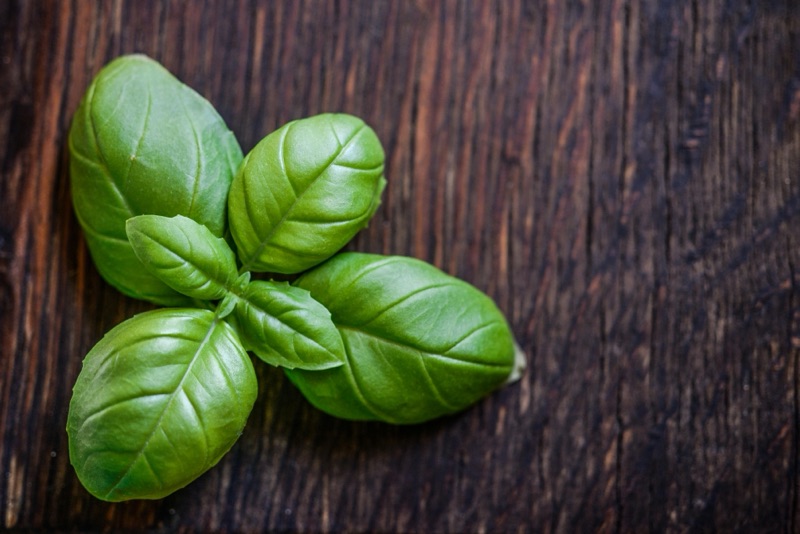Basil
by Wanderer MoonChild
🌱 Botanical Basics
- Common Name(s): Basil, Sweet Basil
- Folk Name(s): St. Joseph’s Wort, Witches’ Herb, King of Herbs, Tulsi (though Tulsi is technically Ocimum sanctum / Holy Basil, a close cousin)
- Scientific/Latin Name: Ocimum basilicum
- Family: Lamiaceae (Mint Family)
- Plant Type: Annual (in most climates), tender perennial in warm/tropical regions
- Botanical Description: Aromatic herb with square stems, bright green to purple ovate leaves, and small white to purple flowers that form on terminal spikes. Grows 12–24 inches tall, highly fragrant when touched.
- Growing Zones/Climate: USDA zones 10–11 as perennial; grown as annual elsewhere. Prefers warm climates.
- Best Zones for Growth: Thrives in zones 4–9 as a summer annual; perennial in subtropical/tropical climates.
- Habitat & Range: Native to tropical Asia and Africa; widely cultivated worldwide for culinary and medicinal use.
🌿 Cultivation & Harvest
- Soil & Sun Requirements: Well-drained, fertile soil rich in organic matter. Full sun (6–8 hours daily).
- Propagation: Commonly grown from seed; can also be propagated from cuttings.
- Companion Planting: Excellent companion to tomatoes, peppers, oregano, marigolds. Repels mosquitoes, flies, and some pests.
- Harvesting Guidelines: Harvest leaves regularly to encourage bushy growth; pinch off flower spikes to extend leaf production. Best harvested in morning after dew has dried.
- Drying/Preservation: Air-dry in small bundles, use dehydrator, or freeze fresh leaves in oil or water to preserve flavor.
🌸 Traditional & Historical Use
- Cultural Significance: Sacred in many cultures; in India, Holy Basil (Tulsi) is revered and used in daily ritual. In Europe, basil was linked to love, wealth, and protection. In ancient Greece and Rome, basil was associated with both love and mourning.
- Traditional Medicine: Used in Ayurvedic, Chinese, and Mediterranean medicine for digestive issues, fevers, headaches, coughs, and infections.
- Symbolism: Basil often symbolizes love, fertility, protection, and prosperity.
🌼 Medicinal & Practical Properties
- Active Constituents: Essential oils (linalool, eugenol, methyl chavicol), flavonoids, tannins, saponins, vitamins A, C, K, and minerals.
- Medicinal Uses: Anti-inflammatory, antibacterial, digestive aid, carminative, adaptogenic (especially Holy Basil/Tulsi). Used for colds, stomach upset, stress, headaches.
- Preparation Methods: Fresh leaves as tea; tinctures; infused oils; poultices; culinary use as seasoning.
- Dosage & Guidelines: Tea: 1–2 tsp fresh/dried leaves per cup, up to 3 times daily. Tincture: 2–4 mL, up to 3x daily. (Varies by preparation and health need.)
- Safety/Precautions: Generally safe; excessive consumption may thin blood (eugenol content). Avoid in large medicinal doses during pregnancy without guidance.
🌙 Magical & Spiritual Properties
- Elemental Association: Fire (sometimes Air, depending on tradition)
- Planetary/Deity Correspondence: Mars, sometimes Venus; associated with Vishnu, Lakshmi, and love/protection deities.
- Magical Correspondences: Love, prosperity, protection, purification, wealth-drawing, banishment of negativity.
- Ritual Use: Used in love spells, money-drawing charms, purification baths, protective sachets, and as an offering herb. Sprinkled at doorways to attract blessings or deter evil.
- Symbolism in Divination/Dreams: Seeing basil in dreams may symbolize reconciliation, success, or romantic opportunities.
🌍 Ecological & Culinary Uses
- Pollinator Value: Highly attractive to bees, butterflies, and pollinators when flowering.
- Wildlife Uses: Provides nectar for pollinators; leaves are aromatic deterrents to pests.
- Culinary Uses: Staple herb in Mediterranean, Asian, and African cuisines. Used fresh or dried in sauces, soups, salads, and oils (notably pesto).
- Household/Practical Uses: Basil oil can be used as a natural insect repellent; infused water used for cleansing spaces.
⚡ Fast Facts
- Quick Uses: Soothes digestion, repels insects, enhances flavor in cooking, used in spells for love and prosperity.
- Notable Traits: Grows quickly, very fragrant, both culinary and magical versatility.
- Special Notes: Basil placed in a shop is said to attract wealth and customers; carried on the body for courage.
📖 Supporting Notes
- Grieve, M. A Modern Herbal
- Duke, J.A. Handbook of Medicinal Herbs
- Bremness, L. Herbs
- Chevallier, A. The Encyclopedia of Medicinal Plants
- Cunningham, S. Encyclopedia of Magical Herbs

No comments:
Post a Comment